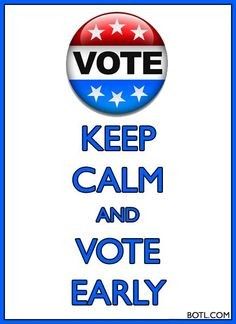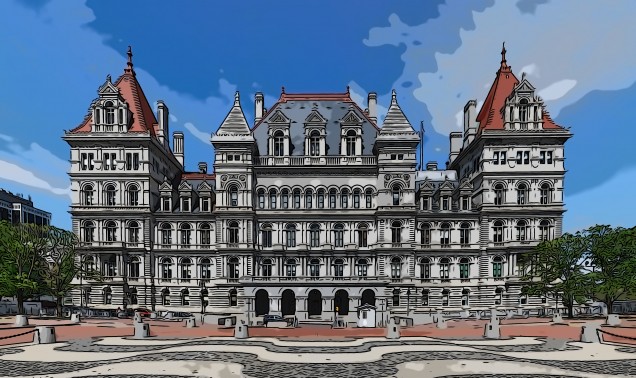New York State’s Missed Opportunity On Early Voting Propositions
It’s no secret that the United States has one of the lowest voter turnout rates of any established democracy. Data provided by the Pew Research Center shows that out of the 35 members of the Organization for Economic Cooperation and Development (OECD), the United States places 28th for voter turnout. Only a little more than half of the U.S.’s voting age population participated in the 2016 elections. One reason for low voter participation that reformers consistently point to is the fact that Election Day is on a Tuesday in November.
Americans have been voting on the Tuesday after the first Monday in November since 1845 when Congress decided to set a national election day. In the 1840s, elections on a Tuesday made sense. People traveled by buggy and would make the journey into town for the market which was generally held on Wednesdays. By setting election day on Tuesday, Congress made it convenient for people to vote because they were in town anyways. However, today many people work on Tuesdays which makes less it a less practical day of the week to have an election than it was in 1845.
One way states have dealt with the difficulties created by Election Day falling on a Tuesday has been to develop provisions for early voting. Early voting allows people to cast a ballot in person at either an elections office or other specified location at some point before the federally designated Election Day. As of 2017, 37 states allow registered voters to vote during a specific period of time before Election Day, and 22 states provided an option to vote during the weekend. Early voting begins in some states as early as 45 days before the election or as late as the Friday before election day, although the average early voting start date is 22 days before Election Day. Generally early voting ends a few days before Election Day.
New York is one of only thirteen states that does not allow early voting. It does have absentee ballots, but allows voters to use them only if they are out of the county or otherwise unable to vote on election day as a result of illness or disability. New York has dismally low voter participation rate, and in the 2016 election New York state ranked 42nd in voter turnout with only about 59% of eligible voters voting. For years there have been attempts to update New York’s voting laws, but resistance from the Republican controlled Senate has led to the failure of these bills.
However, that may soon change. Since early 2017 there appears to be increased attention to and political will for election reform. In January of 2017, former Attorney General Eric Schniederman introduced the New York Votes Act which included provisions for automatic registration of eligible voters, early voting, and no-excuse absentee voting. The bill was sponsored by the Chairman of the Election Law Committee, Assemblyman Michael Cusick (D-Statent Island). The bill is currently in committee.
In January of 2018, Senator Brian Kavanagh (D-Brooklyn and Lower Manhattan) introduced Senate Bill S7400A which would create an eight-day early voting period that would be funded by the state. The bill is currently in the election law committee, and has received support from Democrats including Democratic Conference Leader, Andrea Stewart-Cousins (D-Yonkers), a cosponsor of the bill. Senator Stewart-Cousins called New York voter turnout “extremely embarrassing” and stated that “Our bills will modernize voter registration, implement early voting, protect voters’ rights, and cut red tape which has kept far too many New Yorkers from exercising their constitutional right.”
Republicans have also introduced their own election reform legislation. Senate Bill S7212 sponsored by Republican Senator Betty Little (R- Queensbury) would allow early voting beginning 14 days before the general election. Senator Little remarked “The people this would help the most are the families, people who are working with children in school, with sports activities and homework…They intend to vote; they just don’t get there that day.” Assemblywoman Nily Rozic (D, WF-Fresh Meadows) sponsored the Assembly version of this bill.
On February 12, 2018, drawing on aspects of both Senator Kavanagh’s bill as well as Senator Little’s bill, Governor Andrew Cuomo announced a 30-day budget amendment which would provide approximately $7 million in FY2019 for counties to run early voting programs. Governor Cuomo’s plan calls for counties to provide early voting opportunities during the twelve days prior to Election Day, and requires that voters have at least eight hours on weekdays and five hours on weekends to cast their vote. Counties must also provide at least one early voting site for every 50,000 residents, the location of which will be determined by the bipartisan County Board of Elections.
Several groups have expressed support for early voting including labor unions, good government organizations, and the League of Women Voters. Proponents of early voting claim that if people were able to vote at a time that was more convenient for them, there would be broader participation. However, some opponents of early voting have argued that early voting may actually cause lower voter turnout because people will not feel the same social pressure to vote as they do when they are only able to vote on one day. Additionally, people who vote early may not have the same information as people who vote on Election Day because advertising and campaigning intensifies as Election Day approaches. In the past Republican leaders in the Senate have expressed a hesitancy to change the system, though the spokesman for Senate Republican Leader John Flanagan (R- Suffolk County) recently stated “Our conference has supported electoral reforms in the past, and we would expect to do so again…But we have not discussed that specific proposal recently.”
Whether New York will ever adopt early voting is still unsettled. The legislature voted on the Governor’s budget in late March, but the Senate majority removed the early voting provisions. In mid-April, the Assembly passed election reform bills to authorize 7 day advance voting, overhaul the voter registration process and allow for online registration. The Senate referred the bills to the Election Committee, and then on June 20, the session came to a quiet end without any action on voting. Speaker Heastie does not anticipate any more legislative meetings until the new legislature is seated in January 2019. Perhaps the elections will break the logjam in the Senate and early voting in New York will become a reality.
 Meghan Hayes anticipates graduating from Boston University School of Law in May 2019.
Meghan Hayes anticipates graduating from Boston University School of Law in May 2019.


